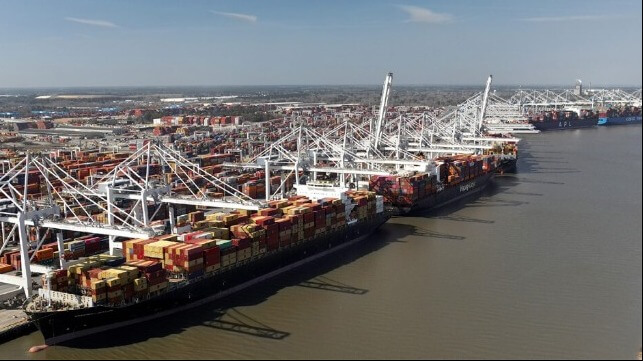Industry-Led Study on Developing Ammonia Bunkering Set for Savannah

A collation of leading companies from across the sectors of the shipping industry is coming together for one of the most comprehensive studies yet undertaken to explore the infrastructure needed to support ammonia as a marine fuel. The project aims to be one of the pioneers in establishing a comprehensive and competitive supply chain for the provision of green ammonia ship-to-ship bunkering on the U.S. East Coast.
The study will be conducted at the Port of Savannah, the third busiest gateway for containerized trade in America. The companies and organizations participating are the American Bureau of Shipping, A.P. Moller – Maersk, Fleet Management, Georgia Ports Authority, the Maersk Mc-Kinney Moller Center for Zero Carbon Shipping, Savage, Sumitomo Corporation, and TOTE Services.
“We recognize that ammonia presents a specific set of safety and technology challenges,” said Panos Koutsourakis, Vice President, Global Sustainability at the American Bureau of Shipping. “We look forward to engaging with the other project members and sharing our industry-leading experience with ammonia-fueled vessels to support the study.”
The study aims to cover the entire end-to-end supply chain of ammonia bunkering, which includes the development of a cost-effective green ammonia supply chain, the design of an Ammonia Bunkering Articulated Tug-Barge (AB-ATB), as well as related supply chain infrastructure. In addition, safety assessments are critical to formulating standards for use of ammonia as a marine fuel. Relevant government agencies and experts in the U.S. will also be engaged in working toward the standardization of safe operations and regulations.
“Enabling sustainable and scalable alternative fuel pathways is critically important for building confidence and investment appetite in fuel supply chains,” said Claus Winter Graugaard, Chief Technology Officer at Maersk Mc-Kinney Moller Center for Zero Carbon Shipping. “The Port of Savannah project is a great logistical entry point for qualifying how ammonia could be made available. Furthermore, it provides a local and regional use case for commercial activation in the U.S. East Coast.”
Announcing the signing of the Memorandum of Understanding to jointly conduct a feasibility study, the group highlighted that the Port of Savannah will have the ability to serve numerous ammonia-fueled Ultra Large Container Ships (ULCSs), which could lead to fast and high-efficient decarbonization in the container shipping industry. The port is home to the largest single container terminal in the U.S., and its current expansion project will provide the ability to accommodate six 14,000TEU vessels simultaneously by 2024, and is planning to add 60% more capacity by 2025. Savannah’s proximity to the Ports of Brunswick and Jacksonville – among the nation’s busiest vehicle handling ports – might also help facilitate decarbonization efforts in the automotive shipping industry.
Morten Bo Christiansen, Head of Energy Transition at A.P. Moller-Maersk highlights the company and the industry’s need for huge amounts of green fuel to meet the goals for decarbonization. He notes while green methanol appears to be the only pathway that is certain to have a material impact this decade, that the industry given the enormity of the challenge ahead must keep exploring additional new fuel pathways.

that matters most
Get the latest maritime news delivered to your inbox daily.
“Safety and environmental challenges related to ammonia’s toxicity must be addressed in the short term, and we must get a solid understanding of the cost of bunkering ammonia,” said Christiansen. “This study will help our industry better understand the full spectrum of practical and safety considerations when dealing with green ammonia as a fuel.”
Sumitomo Corporation notes that efforts are already underway in other parts of the world to develop the ammonia supply chain. Koji Endo, General Manager of the Energy Division at Sumitomo notes that his company looks to build the first Ship-to-Ship ammonia bunkering base in the U.S. in addition to Singapore and Oman.
